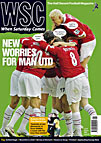 The problem with a campaign to clean up sport's governing bodies is knowing where to start, as Steve Menary reports
The problem with a campaign to clean up sport's governing bodies is knowing where to start, as Steve Menary reports
Anti-corruption coalition Transparency International has put together guidelines aimed at stamping out corruption in international sport, including football.
The guidelines were launched at the fourth Play The Game conference in Copenhagen by Michael Zen-Ruffinen, who as secretary general of FIFA accused Sepp Blatter of financial mismanagement. Zen‑Ruffinen was purged from FIFA after Blatter was re‑elected as president and charges against him were dropped by the Swiss police.
A meeting of journalists and academics from around the world, the conference heard the recommendations that were drawn up with the help of Norwegian academic Professor Hans Skaset. The report is aimed at providing ethical guidelines aimed at holding sports and government officials to account. Jan Borgen of Transparency International’s Norwegian branch said: “They will never satisfy all parties, but are aimed at attracting the widest possible acceptance.”
The recommendations included prevention of questionable relationships developing between national associations and sponsors, and encouraging people to speak out over any form of corruption. The report also suggested that international sports bodies such as FIFA should not be allowed to claim exemption from national legislation over criminal investigations.
John Githongo, a former permanent secretary of ethics and governance in Kenya, whose football federation the KFF was suspended by FIFA in June 2004, welcomed the recommendations. Mr Githongo told Play The Game that action must be taken to stop football becoming “the preserve of a few corrupt individuals at the expense of the majority” – but then left the conference refusing to speak to African journalists or give them a copy of his speech.
The KFF was suspended by FIFA after being accused of stealing 55 million Kenyan shillings, which is about £420,000 and enough to run the Kenyan Premier League and the national team for an entire year. In a presentation entitled “Greed vs Good Governance: the fight for corruption-free football in Kenya”, Bob Munro, the chairman of top Kenyan side Muthare United, explained how FIFA was forced to take this action by Kenya’s top 11 clubs resigning to set up their own competition.
Transparency International’s recommendations also focused on the media and suggested that social issues in sport should be monitored – something the BBC’s Football Focus would claim to be doing with its new series of community films. The recommendations also advocated sanctions against breaches of codes of conduct and the holding to account of international sport bosses that use their positions for private gain.
Although Zen-Ruffinen did not speak directly about FIFA, this point was aimed at his former boss Blatter and his organisation, which came in for criticism over the millions of pounds being poured into Third World football via its financial assistance programme and Project Goal initiative.
Between 2003 and 2006, FIFA will plough 100 million Swiss francs (about £44m) into Goal, but was accused at Play The Game of using this cash to secure members’ votes in elections. Caribbean journalist and radio broadcaster Ian Magic Hughes raised questions over what is happening to FIFA’s Goal funds being sent to his native Antigua & Barbuda.
Co-organiser and journalist Andrew Jennings launched a broadside at FIFA over ballot-rigging and how World Cup finals tickets sent to international associations turn up being sold privately for large sums.
The conference also asked FIFA about what had happened to regular payments of $250,000 a year (£144,000) that have been made annually since 1998 to the FA in the pariah state of Myanmar (formerly Burma). In its response to Play The Game, FIFA insisted that this money was not just handed over to the Myanmar FA but to contractors doing development work, though admitted: “So far, there has not been a central audit done.” FIFA said a local audit had been carried out under the supervision of accounting giant KPMG, but only described the results as “adequate”.
The more you hear about international football’s murky finances, the more you feel that you haven’t heard the worst yet.
From WSC 227 January 2006. What was happening this month